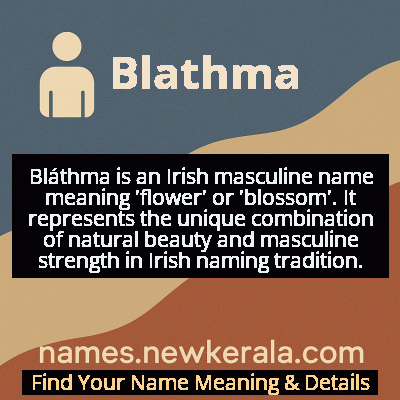Blathma Name Meaning & Details
Origin, Popularity, Numerology Analysis & Name Meaning of Blathma
Discover the origin, meaning, and cultural significance of the name BLATHMA. Delve into its historical roots and explore the lasting impact it has had on communities and traditions.
Name
Blathma
Gender
Male
Origin
Irish
Lucky Number
3
Meaning of the Name - Blathma
Bláthma is an Irish masculine name meaning 'flower' or 'blossom'. It represents the unique combination of natural beauty and masculine strength in Irish naming tradition.
Blathma - Complete Numerology Analysis
Your Numerology Number
Based on Pythagorean Numerology System
Ruling Planet
Jupiter
Positive Nature
Optimistic, inspirational, and creative.
Negative Traits
Scattered, exaggerating.
Lucky Colours
Yellow, gold, purple.
Lucky Days
Thursday.
Lucky Stones
Yellow sapphire.
Harmony Numbers
1, 2, 9.
Best Suited Professions
Arts, writing, communication.
What People Like About You
Creativity, optimism.
Famous People Named Blathma
Bláthma mac Flainn
Medieval Scholar
Recorded in the Annals of Ulster as a learned man and poet in early Christian Ireland
Bláthma Ua Flainn
Clan Chieftain
Leader of the Uí Flainn clan in Connacht, mentioned in historical genealogies
Bláthma Ó Maolconaire
Scribe and Historian
Member of the famous Ó Maolconaire literary family who preserved Irish manuscripts
Name Variations & International Equivalents
Click on blue names to explore their detailed meanings. Gray names with will be available soon.
Cultural & Historical Significance
Throughout Irish literary history, names like Bláthma were preserved by scholarly families who maintained the oral and written traditions of Gaelic culture, ensuring that such poetic names survived despite centuries of cultural pressure. The name represents a bridge between the ancient druidic reverence for nature and the Christian monastic tradition of scholarship that flourished in medieval Ireland. Its continued, though rare, usage today speaks to the enduring power of Ireland's linguistic heritage and the modern desire to reconnect with authentic Gaelic naming practices that predate English influence.
Extended Personality Analysis
Individuals named Bláthma are often perceived as having a unique blend of strength and sensitivity, reflecting the name's floral meaning combined with its masculine energy. They tend to be creative, observant, and deeply connected to nature and beauty in various forms. While maintaining traditional values of loyalty and honor, they often approach challenges with thoughtful consideration rather than brute force. This combination makes them particularly effective in roles requiring both analytical thinking and emotional intelligence.
Their personality typically combines the resilience of ancient Irish warriors with the poetic sensibility of bards, making them effective communicators who can inspire others through both words and actions. This balance allows them to navigate complex social situations with grace and to appreciate the subtle beauty in everyday life, while still possessing the determination to pursue their goals with steadfast commitment. They often exhibit a quiet confidence that comes from understanding multiple perspectives, and they tend to be natural peacemakers who can find common ground where others see only division. The floral symbolism of their name manifests in their ability to help others 'blossom' through encouragement and support.
Modern Usage & Popularity
In contemporary times, Bláthma remains an exceptionally rare name, primarily used within Ireland by families seeking to revive ancient Gaelic names or maintain strong cultural connections. It appears occasionally in Irish-speaking communities and among diaspora families committed to preserving linguistic heritage. The name has not registered on modern popularity charts and maintains its status as a distinctive choice for parents valuing historical authenticity over current trends. Its usage reflects a growing interest in unique, culturally significant names that stand apart from more common Irish choices like Liam or Seán. While still uncommon, it represents a meaningful option for those deeply invested in Irish heritage and linguistic preservation, often chosen by parents with strong connections to Irish language and history who wish to honor their ancestry through a name that hasn't been widely adopted in modern times.
Symbolic & Spiritual Meanings
Symbolically, Bláthma represents the flowering of potential, beauty in strength, and the cyclical nature of growth and renewal. The floral imagery connects to themes of blossoming talent, the temporary yet recurring beauty of life, and the idea that true strength can incorporate gentleness and aesthetic appreciation. In Celtic symbolism, flowers often represented the soul's journey and the interconnectedness of all life, making Bláthma a name that embodies spiritual growth alongside physical presence. The combination of masculine energy with floral symbolism creates a powerful metaphor for balanced character development—where traditional masculine qualities are enriched by sensitivity and artistic perception, much like how a flower's delicate appearance belies its resilience in nature. This symbolic meaning extends to representing hope, new beginnings, and the idea that true power lies in harmonious integration rather than domination.

